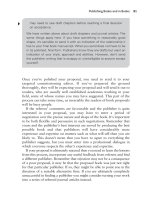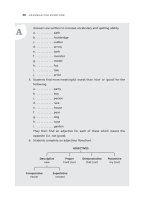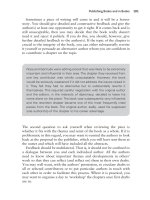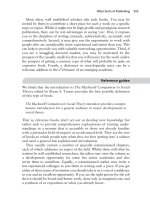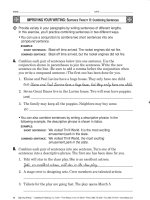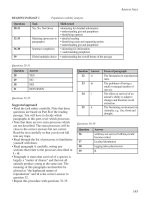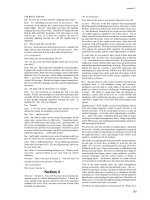Writing for Publication part 11
Bạn đang xem bản rút gọn của tài liệu. Xem và tải ngay bản đầy đủ của tài liệu tại đây (88.57 KB, 10 trang )
may need to see draft chapters before reaching a final decision
on acceptance.
We have written above about draft chapters and journal articles. The
same things apply here. If you have something in reasonably good
shape, it’s sensible to send it with an indication of the relationship it
has to your final book manuscript. What you send does not have to be
in its polished, final form. Publishers know they are drafts but want an
indication of your style, approach and abilities. However, don’t send
the publisher writing that is scrappy or unintelligible to anyone except
yourself.
Once you’ve polished your proposal, you need to send it to your
targeted commissioning editor. If you’ve prepared the ground
thoroughly, they will be expecting your proposal and will send it out to
readers, who are usually well established academics working in your
field, some of whose names you may have suggested. This part of the
process can take some time, as invariably the readers of book proposals
will be busy people.
If the referees’ comments are favourable and the publisher is quite
interested in your proposal, you may have to enter a period of
negotiation over the precise nature and shape of the book. It’s important
to be both flexible and persuasive in such negotiations. Remember that
yours and the publisher’s best interests are served by producing the best
possible book and that publishers will have considerably more
experience and expertise on matters such as what will sell than you are
likely to. This doesn’t mean that you have to agree to everything the
publisher suggests, but you must enter into a professional dialogue in
which everyone respects the other’s experience and expertise.
If your proposal is ultimately rejected then you need to learn the lessons
from this process, incorporate any useful feedback from referees and find
a different publisher. Remember that rejection may not be a consequence
of a poor proposal, it may be that the proposed book was just not right
for that particular publisher. If so, they might be able to point you in the
direction of a suitable alternative firm. If you are ultimately completely
unsuccessful in finding a publisher you might consider turning your work
into a series of refereed journal articles instead.
Publishing Books and in Books
91
8
Boden(3)-05.qxd 10/20/2004 6:00 PM Page 91
Contracts
Contracts are binding legal agreements between you and the publisher.
They set out the terms on which the book will be released. These terms
should include matters such as:
• The format of the book, for example hardback, softback or both and
the number of copies to be printed in the first print run. This is an
important matter. Some publishers usually produce hardback and
softback editions simultaneously. This is advantageous to the author
because hardback books are much more expensive to buy and
consequently sales of them are low. Other publishers, who make their
financial margins on copies sold to libraries, tend to be predisposed to
producing only a hardback edition on the first print run unless they are
absolutely convinced that paperback sales will be significant. Think
about these things when targeting a publisher and engaging with them.
• Copyright matters. This is a very important matter. In signing a
contract you are giving the publisher the right to economically exploit
your work in return for royalty payments. We dealt with IPR at
some length in Chapter 3.
• Needless to say, you should pay careful attention to financial
matters especially if you think that the book is likely to be a runaway
best-seller. The contract will lay down the basis on which you will
be paid royalties for your book, including any advance. It will
specify the percentage of net profit that you will receive from sales
of copies of the book and other sales of rights. It is a good idea to
negotiate a differential rate depending on the number of copies sold,
so that you get a higher rate once the sales of your book exceed a
certain number (usually 2,000 or 3,000 copies).
• One of the most vexed issues that the contract will address is the
date for the delivery of your finished typescript to your publishers.
It is reasonable for publishers to need to know when to expect your
manuscript. They need to plan their complicated production
schedules, marketing and so on and produce reliable catalogues.
• The contract will undoubtedly specify the form that your typescript
must be delivered to the publishers in and also some form of
wording about it being to an acceptable standard and within spitting
distance of what you promised in your proposal. The publisher
usually reserves the right not to publish if you are deemed to be in
breach of such undertakings.
Writing for Publication
92
Boden(3)-05.qxd 10/20/2004 6:00 PM Page 92
• Other stuff the contract is likely to include are matters such as who
decides what goes on the jacket, the rights to produce further
editions and who will produce and maintain any websites associated
with the book. The contract is also likely to specify that you will be
personally liable if you libel someone. Be careful about what you’re
getting into.
It goes without saying that you should read the contract carefully, ask
about anything you don’t understand or are not happy with and think
about showing it to the appropriate person in your university if there is
anything you are not sure about.
Writing and editing
The beauty of having a good proposal, whether it is for an edited
collection or a research monograph, is that, like a research proposal (see
Getting Started on Research), it gives you a clear route map of how to
proceed with your work. The approach needed and the work involved
for research monographs differs somewhat from that required for
edited collections. We’ll deal with each in turn.
Writing research monographs
Whilst research monographs are a particular generic form, the points
we made earlier in Chapters 2, 3 and 4 hold for writing books. If it’s a
while since you read those, you might like to refresh your memory on
these points. In addition, there are some further considerations you need
to address in writing your book.
• It may sound obvious, but a research monograph is a monograph –
a book around a particular theme. This means that you need to be
particularly careful to achieve coherence from start to finish of your
book. Don’t try to tell too many stories or introduce too many themes
in one book. Give the poor reader the clear impression of moving
through a seamless but developing argument.
• Authoring a book is undoubtedly a very substantial and complex
project. If you have written a doctoral thesis you will have
experience of such sustained writing and will know that you need
Publishing Books and in Books
93
Boden(3)-05.qxd 10/20/2004 6:00 PM Page 93
to plan, set yourself milestones, be well organised and generally keep
yourself on course.
• Think about how you will get sufficient ‘joined up’ time to get this
complex writing done and do not underestimate the amount of
mental energy and emotional commitment needed. You cannot fit
the activity in to ‘the odd hour’ here and there. Plan ahead: you may
be able to get a sabbatical or other paid leave from regular teaching
or administration work or you might decide to timetable your
writing in student vacations. You will need to liaise with any co-
author(s) on such timetables.
• End details are important. Think about style as you go along and be
consistent. This is easier to do from the start than to have to do a
huge retrospective edit for style. ‘Cite while you write’: trying to
compile a bibliography at the end of a complex piece of writing is
likely to drive you mad and almost inevitably leads to errors and
omissions. Early on in the process the publisher will either send you
a hard copy of their style guidelines or ask you to look at them on
their website. The best way to deal with this is to adapt your writing
and formatting to the relevant style from the beginning.
We’re aware that a number of people reading this book will have a
doctoral thesis that they are thinking of turning into a book. As we’ve
already intimated, books and theses are different beasts and achieving
the transition from one to the other merits a special note here. The key
difference between the two genres is that the thesis demonstrates your
competence as a researcher and scholar. The focus is, therefore, on how
the study was conceived, designed and conducted. By implication, if you
have done this well, the thesis will be a contribution to knowledge. The
writing that you do is the story of how you conducted the study and
how that resulted in a contribution to knowledge.
In contrast, the emphasis in a book lies in the knowledge itself, and
the story of the study (for instance, the techniques used) is of secondary
importance, there to give legitimacy to the knowledge claims made.
This makes a thesis quite unsuitable for publication as a research mono-
graph as it stands. That said, if you have a thesis, you will have a substantial,
well thought out, well structured and theorised research document that
you can quite possibly revise into monograph format by shifting the
emphasis of the writing.
One of the key things you need to do is to think about the difference
between the readership of the two documents. Your thesis will be read
Writing for Publication
94
Boden(3)-05.qxd 10/20/2004 6:00 PM Page 94
by very few people (chiefly your supervisors/advisers and examiners)
and for a very specialised purpose (to pass an examination). In contrast,
the audience for your book will be much more diverse and have a range
of motivations. They will not necessarily be specialists in your field and
they certainly won’t be formally examining you. This means that the
close scrutiny given to a thesis is never accorded a book. There are two
principal implications for you as a writer.
First, in a thesis the golden rule is ‘if in doubt, leave it in’, as
you need to make sure that all your knowledge claims are com-
prehensively and reliably justified. The fact that in the UK the oral
examination is often referred to as a ‘defence’ of the thesis gives an
indication of the imperatives in this regard. In contrast, with a book
the golden rule is ‘if in doubt, leave it out’. You do no kindness to the
reader of a book by bludgeoning them with data and references,
forcing them to wade through a morass of justificatory evidence. Of
course, this is no excuse for sloppy scholarship or unfounded asser-
tions rather than rigorous arguments – it’s all a matter of balance and
judgement.
Second, whereas there are certain necessary elements in a thesis,
such as a detailed description of the methodology, historiography or
whatever, these may not be relevant or appropriate in book format.
Conversely, you may have material or case studies or other evidence
that you decided to omit from your thesis but which would fit well into
your book.
Writing for and editing collections
Writing for and editing collections is a very different sort of work from
writing journal papers or monographs. In this section we talk first
about writing for and then about editing collections. If you are a com-
paratively inexperienced researcher then you are more likely to be involved
in writing than in editing.
Invitations to contribute to edited collections tend to be a product
of good networking (see Building Networks), producing polished
conference papers, working collaboratively with others, attending
seminars and workshops and in general making sure that you avail
yourself of every sensible opportunity to participate in the wider
academic community. Consequently, if you do become involved in an
edited collection, it’s important to demonstrate all the attributes of a
good colleague. This means that you will:
Publishing Books and in Books
95
Boden(3)-05.qxd 10/20/2004 6:00 PM Page 95
